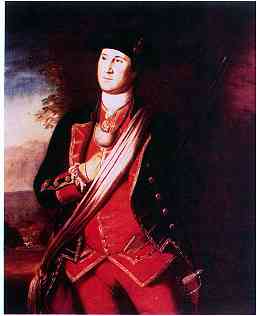

The French and Indian War (also known as the "Seven Years War")
saw the British pitted against the French, the Austrians, and the Spanish.
This war raged across the globe.
The war in the Americas started inauspiciously.
Twenty two year old George Washington was forced to surrender Fort Necessity in the Ohio Valley in 1754.

The following year, British general Edward Braddock attempted to attack the French held Fort Duquesne.
British troops were ambushed by the French and the Indians.

Braddock was mortally wounded. It fell upon George Washington
to extricate both British and Colonial forces from the wilderness.
In 1758, William Pitt came out of retirement and took over the British war effort.
He directed additional war efforts in the North American war theater.

He also gave the colonists much greater independence in pursuing the war effort.
This increased the enthusiasm among colonialists toward the war.
By the end of 1758, the British had begun to turn the tide in the war in North America.
In September 1759 the British attacked Quebec.
After a five day battle, British and American forces captured Quebec,
ending French control of Canada.

In February 1763, the Treaty of Paris was signed.
In this treaty, title to all French territory;
east of the Mississippi, was ceded to the British.
Discouraged by his defeat and angered by discrimination between
British and colonial officers in rank and pay,
he resigned his commission near the end of 1754.
The next year, however, he volunteered to join
the expedition of British general Edward Braddock against the French.

When Braddock was ambushed by the French and their Indian allies on the Monongahela River,
Washington, although seriously ill,(small pox) tried to rally the Virginia troops.
Whatever public criticism attended the debacle, Washington's own military reputation was enhanced,
and in 1755, at the age of 23,
he was promoted to colonel and appointed commander in chief of the Virginia militia, with responsibility for defending the frontier.

In 1758 he took an active part in the successful campaign of Gen. John Forbes against Fort Duquesne. From his correspondence during these years,
Washington can be seen evolving from a brash, vain, and opinionated young officer,
impatient with restraints and given to writing admonitory letters to his superiors,
to a mature soldier with a grasp of administration
and a firm understanding of how to deal effectively with civil authority.


Next Page



